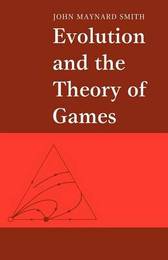
|
Evolution and the Theory of Games
Paperback / softback
Main Details
| Title |
Evolution and the Theory of Games
|
| Authors and Contributors |
By (author) John Maynard Smith
|
| Physical Properties |
| Format:Paperback / softback | | Pages:234 | | Dimensions(mm): Height 215,Width 144 |
|
| ISBN/Barcode |
9780521288842
|
| Classifications | Dewey:575 |
|---|
| Audience | | Professional & Vocational | |
|---|
| Illustrations |
Worked examples or Exercises
|
|
Publishing Details |
| Publisher |
Cambridge University Press
|
| Imprint |
Cambridge University Press
|
| Publication Date |
21 October 1982 |
| Publication Country |
United Kingdom
|
Description
Professor John Maynard Smith has written an account of a new way of thinking about evolution which has been developed in the last ten years. The theory of games, first developed to analyse economic behaviour, is modified so that it can be applied to evolving populations. John Maynard Smith's concept of an evolutionarily stable strategy is relevant whenever the best thing for an animal or plant to do depends on what others are doing. The theory leads to testable predictions about the evolution of behaviour, of sex and genetic systems, and of growth and life history patterns. This book contains the first full account of the theory, and of the data relevant to it. The account is aimed at senior undergraduate and graduate students, teachers and research workers in animal behaviour, population genetics and evolutionary biology. The book will also be of interest to mathematicians and game theorists; the mathematics has been largely confined to appendixes so that the main text may be easily followed by biologists.
Reviews"Of those two near-contradictory things publishers say about a book, that it is 'seminal' and that it is 'long-awaited', Evolution and the Theory of Games somehow manages to make me think of both at once...This is a book that must be read by every serious ethologist/sociobiologist...It is unmistakably a brilliant book by one of the most important contributors to ethology in its history, still at the height of his powers. The only reason we don't call him an ethologist is that he is so much else besides...the gems of wisdom and biological insight are still there on every page, and ethologists can spend many happy field sessions testing the ideas here." Richard Dawkins, Animal Behaviour
|